#Asma Al-Assad
Text
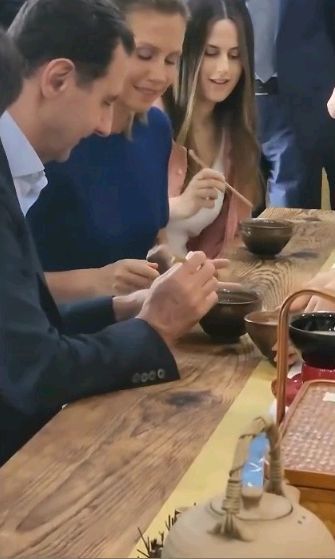
#screenshot from a video#it looked like they were making coffee or matcha art#cute#cute 😊#Assad#Bashar al-Assad#Asma al-Assad#Zein al-Assad#Assads#Syria#Xiaoqing model village#Hangzhou#China
25 notes
·
View notes
Text


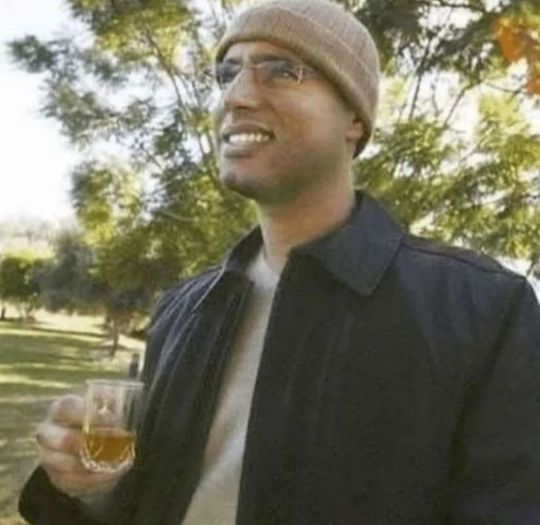
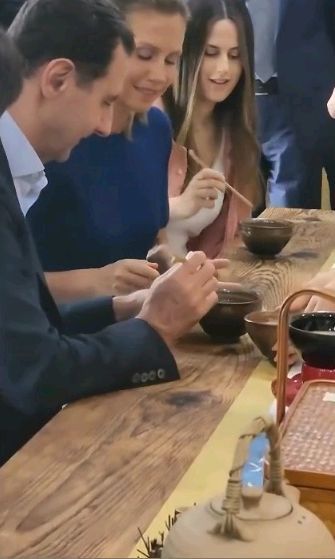
#hafez al assad#bashar al assad#asma al assad#zein al assad#assads#syria#gaddafi#muammar gaddafi#saif al islam gaddafi#gaddafis#libya
4 notes
·
View notes
Photo

(via Allocution de Mme Asma al-Assad devant l’Université des Études étrangères à Beijing)
Il est indubitable que nous sommes tous confrontés aux mêmes tentatives d’extinction des cultures nationales des peuples par des moyens multiples quant à leur forme, mais dont le fond est toujours le même. Des tentatives menées au titre du développement et de la modernité, mais dont le contenu est la dissolution de l’identité et de l’appartenance avec l’une des armes les plus puissantes pour y parvenir : l’attaque des langues maternelles et un regard considérant ceux qui s’y accrochent comme rétrogrades. Car, dominer le langage est le chemin le plus court pour dominer la conscience et, par conséquent, empêcher toute indépendance décisionnelle, brouiller les sociétés, effacer leur identité et leur singularité.
1 note
·
View note
Text
I recently learned that in March 2011, the same month as the large-scale protests against Syrian dictator Bashar al-Assad which eventually turned into the Syrian Civil War, Assad paid US public relations agents to get his wife a puff piece in Vogue about how she's a genius girlboss with great fashion sense and a heart of gold
Asma al-Assad is glamorous, young, and very chic—the freshest and most magnetic of first ladies. Her style is not the couture-and-bling dazzle of Middle Eastern power but a deliberate lack of adornment. She’s a rare combination: a thin, long-limbed beauty with a trained analytic mind who dresses with cunning understatement. Paris Match calls her “the element of light in a country full of shadow zones.” She is the first lady of Syria.
Syria is known as the safest country in the Middle East, possibly because, as the State Department’s Web site says, “the Syrian government conducts intense physical and electronic surveillance of both Syrian citizens and foreign visitors.” It’s a secular country where women earn as much as men and the Muslim veil is forbidden in universities, a place without bombings, unrest, or kidnappings, but its shadow zones are deep and dark. Asma’s husband, Bashar al-Assad, was elected president in 2000, after the death of his father, Hafez al-Assad, with a startling 97 percent of the vote. In Syria, power is hereditary. The country’s alliances are murky. How close are they to Iran, Hamas, and Hezbollah? There are souvenir Hezbollah ashtrays in the souk, and you can spot the Hamas leadership racing through the bar of the Four Seasons. Its number-one enmity is clear: Israel. But that might not always be the case. The United States has just posted its first ambassador there since 2005, Robert Ford...
The 35-year-old first lady’s central mission is to change the mind-set of six million Syrians under eighteen, encourage them to engage in what she calls “active citizenship.” “It’s about everyone taking shared responsibility in moving this country forward, about empowerment in a civil society. We all have a stake in this country; it will be what we make it.”
In 2005 she founded Massar, built around a series of discovery centers where children and young adults from five to 21 engage in creative, informal approaches to civic responsibility. Massar’s mobile Green Team has touched 200,000 kids across Syria since 2005. The organization is privately funded through donations. The Syria Trust for Development, formed in 2007, oversees Massar as well as her first NGO, the rural micro-credit association FIRDOS, and SHABAB, which exists to give young people business skills they need for the future.
110 notes
·
View notes
Text

“Lalla Salma was not very popular. Rania occupied the first place after Sheikha Mozah, after Suzanne Mubarak, after Asma al-Assad and after Laila bin Ali. Why are attempts to promote it now while it is in hiding? I think Moroccan women took advantage of Rajwa to promote Lalla Salma, but sometimes they would get upset and ask someone where she is, what a funny thing.” - Submitted by Anonymous
11 notes
·
View notes
Text

[ID: a photo of Asma Al-Assad shaking hands with Queen Elizabeth while Bashar stands and smiles. end ID.]
idiot cunts in their idiot gathering
2 notes
·
View notes
Text
BOOKS Dispatches from the shadows


PR pro dishes on his shady dealings with some notable names
Meet Phil Elwood, an insider’s insider of Washington.
A public relations professional, he has stealthily managed challenging assignments over the years, from Qatar’s contested World Cup bid to Vogue ’s disastrous 2011 profile of Bashar al-Assad’s wife, Asma.

His passion is controlling the narrative — leveraging valuable intelligence and his media savvy to deliver for clients.
And oh, what a client list it is.
Under the surface, though, Elwood is a wreck.
Diagnosed with depression when he dropped out of college, he self-medicated with booze (and more) as he built his Washington career, battling a succession of mental health crises that culminated in a suicide attempt.
After recovering from that episode, he’s telling his story in
All the Worst Humans: How I Made News for Dictators, Tycoons, and Politicians ,
an account that’s part therapy, part cautionary tale.
What makes Elwood’s story stand out from the typical Washington read is that his personal demons are so intertwined with his professional choices.
Most dramatic is his realization at the end of the story that his addiction to adrenaline — the power rush from working behind the scenes — is also a feature of his bipolar II disorder, which led him to the edge.
The book also pops because it’s funny — despite everything.
Elwood’s prose is zippy, even Sorkin-esque, and he relishes dark humor.
“Karl Marx said religion was the opium of the people,” Elwood writes in a section about becoming addicted to pain medication following a serious hip injury. “You know what’s a lot more like the opium of the people? Opiates.”
Elwood’s D.C. journey began in the summer of 2000.

Even though he blew up his college career, he finagled a Senate internship with Daniel Patrick Moynihan (D-N.Y.) with the help of a well-connected friend, then landed in the office of Sen. Carl Levin (D-Mich.).

Through Levin’s pull, he completed his formal education, then launched his professional life in Washington PR.
His lucky breaks made it clear to him how unfair the system can be.

He soon landed a job at Brown Lloyd James, the PR shop headed by former Beatles manager Peter Brown with a long client list of what Elwood deems the “worst humans,” including Libyan dictator Moammar Gaddafi and Syrian President Bashar al-Assad.

Needless to say, the job gave Elwood the excitement he craved.
Except that it was a bit too exciting.
One of Elwood’s wildest tales took place in 2009, when, he writes, Brown dispatched him to Las Vegas with Mutassim Gaddafi, son of the Libyan dictator, to make sure he and his entourage stayed out of the headlines while they had fun.

There were drugs, guns, a Cher concert (Mutassim was a fan) and lots of gambling.
A terrified Elwood realized that if anyone in this brutal, unhinged gang wanted to kill him, they’d probably get away with it.
He left Las Vegas relieved to be alive, only to be told he was needed in New York.
This time, it was Mutassim’s father, Moammar Gaddafi, whom BLJ had to (try to) manage during his notorious appearance at the U.N. General Assembly, as part of his short-lived rehabilitation phase with the West.
Tasked with housing and other logistics, the firm scrambled to organize a massive tent on the Bedford, N.J., estate of Donald Trump (the only willing host, according to Elwood) and find a sacrificial goat for the Libyan delegation, just to name a few to-do list items.
Elwood recounts that his moral angst and self-doubt became more acute in 2010 when he was part of Qatar’s successful effort to beat the United States in its bid to host the 2022 World Cup — a FIFA decision so controversial that the Justice Department eventually investigated.
He was further shaken on a business trip to Bosnia, where he visited the site of a Bosnian Serb massacre of Muslim civilians and was “confronted with the gritty reality of totalitarian power.”

He didn’t have to ponder too long; upon his return, Elwood recalls, Brown told him, “The Arab Spring has been bad for our business model,” and fired him.

Elwood then landed at Levick Strategic Communications.
There the clients were less brutal, but some were still, in Elwood’s assessment, dodgy; he cites the example of Kim Dotcom, a hacker and internet entrepreneur who has had decades of run-ins with the law.
Eventually, Elwood started his own shop.

This time, he worked with an Israeli firm, Psy-Group, that became ensnared in the Mueller investigation for allegedly pitching an election influence campaign to Trump’s team in 2016.
Elwood was questioned by the government but let go — and deftly managed to keep his name out of the press.
Another close brush.
One of the juiciest parts of Elwood’s story is his work with the media.
Early on, after he negotiated with CNN to air a strategically useful clip, he describes an “aha” moment:
“My job isn’t to manipulate public opinion. My job is to get gatekeepers like CNN to do it for me.”
This sounds cynical, but what he describes is an exchange in which both sides mutually benefit.
Elwood has an innate understanding of how journalists work and genuinely respects them.
He makes that clear as he spills details of his tradecraft: working with reputable reporters at top publications (he divulges a long A-list of names), selectively picking outlets for maximum impact and exploiting the “scoopiness” that journalists prize in exchange for results for his clients.
He describes this quid pro quo as a form of “insider trading” but points out that valuable information in Washington, like all commodities, is appraised and traded on a market.
And information is valuable only if it’s true, or at least true-ish.
To that end, he counsels his fellow PR flacks against trading in bad information — reminding them that good journalists will quickly detect lies when they are handed to them.
Elwood is a troubled but sympathetic narrator, and most readers will probably find themselves relieved to know that, at the end, he’s in a better place.
He closes his story lurking in the background, as a black rectangle on a Zoom call with clients.
But this time, he says, he’s working for “the good guys.”
All the Worst Humans
How I Made News for Dictators, Tycoons, and Politicians
Phil Elwood
Henry Holt, $28.99
All the Worst Humans
Author: Phil Elwood
CHAPTER 1
Of Marble and Giants
EIGHTEEN YEARS EARLIER, JULY 2000
The halls of the Capitol Building are empty this morning.
The clinks of the liquor bottles in the hand truck I’m pushing are the only sound.
I love being alone here, marveling at marble columns propping up carved ceilings.
Under the massive dome of the Rotunda, paintings tell the mythology of early America.

In Statuary Hall, I nod to a bronze statue of Huey Long, an assassinated senator who some consider a hero, others a criminal, and then enter a wood-paneled corridor.
Spiral staircases of iron and marble materialize out of dark corners.
I maneuver the bottles past unmarked doors that lead to the hideaway offices of Senators Trent Lott, Mitch McConnell, and Ted Kennedy.
Senators steal away to these coveted havens to host meetings they’d rather not have eyeballed by reporters or to nap after marathon debates.
The booze is heavy, and I’m out of breath when I reach Sen. Daniel Patrick Moynihan’s hideaway.
Vodka soda sweat leaks through my cheap, white collared shirt.
We interns were out late at Politiki bar last night.
I let myself in and head for the brass bar cart.
Fifths of whiskey, gin, scotch, and Tio Pepe sherry, Moynihan’s favorite, get loaded in and lined up.
When I’m finished, I sit on a leather couch dyed the same dark mahogany as the regal desk and spark up a Camel.
Moynihan is a fellow smoker.
His hideaway reeks of tobacco.
The hundred or so hideaways in the Capitol are passed down through handshake deals.
Seniority rules, and sitting on the Finance Committee doesn’t hurt.
Junior senators fight over windowless basement rooms the size of utility closets and furnished with cots.
Moynihan has earned a view of Pennsylvania Avenue and space for ten people to sip cocktails.
Standing under an oil painting, I pull back the cream-colored curtains and take it all in.
I imagine the senator from New York in here, lighting up, pouring a tumbler of Tio Pepe, and telling stories about the presidents he has advised.
Sitting in the private office of a Senate demigod still doesn’t feel real.
I’m a twenty-year-old college dropout whose only credentials are a job at a Mexican restaurant and a cocaine problem.
The rest of my intern class are the kids of campaign donors and New York City’s financial glitterati.
My dad is a pastor in the other Washington.
He preaches to a congregation in Olympia.
Six months ago, I was a sophomore at the University of Pittsburgh on a debate scholarship.
Debate is about speed.
Being able to talk fast was the prerequisite for entry.
On weekends, I traveled to universities around the nation to argue about what policies would lead to nuclear war.
Rapid-fire reading of news clippings scored points in a round.
So did biting insults lodged at your opponent in an attempt to trap them in a rhetorical mishap.
You won by manipulating the news and calling it “evidence” to advance your argument.
I won a lot.
My grades were nearly perfect until I started working nights as a cook at Mad Mex.
The waiters survived on a diet of wings and cocaine.
One night, one of them noticed that I seemed a bit down and he offered me a pick-me-up from his bag.
It worked.
For fifteen minutes.
Three months later, I was failing five out of five courses.
I don’t believe I attended one.
The week before finals, I called my older brother in a panic.
He jumped on a plane to Pittsburgh.
We debated my options.
I tried to advance the argument for my brother taking my finals.
It was raining when we went to the registrar’s office and filled out the forms.
The first Elwood to drop out of college.
My parents collected me at SeaTac airport.
I deplaned drunk on whiskey and clutching a plush toy of Opus the Penguin, from Berkeley Breathed’s comic strip.
My father shook his head and made me see a shrink.
I snowballed my way through the sessions.
Left out the cocaine use.
The shrink informed me that I was suffering from “situational depression.”
“Since you are removed from the situation,” she explained. “The problem must be resolved.”
“Makes sense,” I said.
It didn’t.
And the depression didn’t lift.
A childhood friend, who I’ll call Preston, worried that I had no prospects after dropping out of school, threw me a lifeline.
His college classmate Eric, a trust fund kid, worked in Washington, DC, as Senator Moynihan’s aide.
If he liked me, Eric could get me an internship on the Hill.
I called Eric, and he told me to meet him the next Tuesday, at 10 p.m., at 1823 M Street.
“Northwest M Street, the one near the White House,” he said. “Do you have a fake ID?”
“Indeed I do.”
“Bring it. You’ll need it in DC,” Eric said. “Your official interview will be on the Hill the next day. But this one is more important. I vet the interns for the staff.”
My parents bought me a suit at the mall, and I flew to Washington.
Résumé in hand, I cabbed it to a redbrick building with blacked-out windows on M Street.
My fake ID fooled the bouncer.
Inside, Ice Cube’s “You Can Do It” played as a dancer sprayed Windex on the pole before taking off her underwear.
A topless woman asked if I wanted some singles.
Eric wasn’t hard to spot.
He was the only other guy wearing a suit in the strip club on a Tuesday night.
He chugged a Bud Light at a table with a clear view of the stage.
I handed him my résumé.
He gave it to a dancer in a neon-yellow G-string.
“Relax,” he said, sliding me a beer. “You met me at Camelot on a Tuesday night. You passed the test.”
In Moynihan’s hideaway, I kill my cigarette and flush it down the toilet.
I lock up, push the empty hand truck past Minority Leader Tom Daschle’s office, and ride an elevator down to the basement.

I flash my badge to a guard, cut through the crypt under the Rotunda, and head into the Capitol Hill Tunnels.
I love these underground passageways, that feeling of special access.
I walk the pedestrian pathway alongside a miniature subway trolley modeled after the Disney World Monorail.
A group of congressional aides are taking the two-minute ride, briefcases on their laps.
To my right, I spot Sen. Fred Thompson.

“Good afternoon, Senator,” I say. “Die Hard Two was on TNT last night.”
“Was it really?” he replies in the deep southern drawl that was so out of place when he played a New York district attorney on NBC’s Law & Order. “Walk me back to my office.”
On the twenty-minute trip to the Hart Building, Thompson asks whether I think DC or Hollywood is the more terrifying place.
I argue in favor of Hollywood.
The Capitol doesn’t frighten me.
Just the opposite.
From the moment I set foot in DC, I knew I was home.
The Hill is a real-world version of debate team.
Everyone talks fast, and there are winners, losers, and nukes.
Last week, I had a drink with Sen. Russ Feingold, who told me stories of working with John McCain and Carl Levin on trying to pass campaign finance reform.

I’ve gone from bussing tables at a Mexican restaurant in Pittsburgh to rubbing elbows with senators.
I never want to leave.
I weave through redbrick-walled tunnels back toward Moynihan’s staff office in the Russell Building.

Discarded and broken office furniture lines the bowels of the Capitol Hill office buildings.
I pass the Senate barbershop, where I recently got a bad haircut sitting next to Majority Leader Lott.

A quick elevator ride up from the basement takes me to Russell’s fourth floor, where I drop off the hand truck and head down a flight of stairs to a private parking lot.
Two interns are already out here smoking.
The senior senator from Michigan Carl Levin’s beaten-up blue Oldsmobile sticks out among the rows of luxury sedans.

I smoke another Camel and watch Kit Bond of Missouri climb out of a black town car.
Kay Bailey Hutchison struts by, followed by her “purse boys,” two young, attractive male aides who carry her luxury bags around Capitol Hill.

When senators bum a smoke before hustling to their next meeting, I feel like a young Henry Hill parking cars for Paulie’s crew in Goodfellas.
It’s almost four o’clock.
In this town, the most important hour is happy hour.
I head back out into the muggy city, down First Street, passing the Supreme Court and the Library of Congress, where 3,700 boxes of Moynihan’s personal papers have been kept for posterity.
It’s the largest one-man collection in the library, Moynihan’s legislative director recently told me over whiskey and Cokes at the Capitol Lounge.
At Pennsylvania Avenue, a helicopter buzzes across the sky.
The pilot shadows a motorcade of black SUVs careening downtown, lights flashing and sirens blaring.
When the street clears, I duck into the Hawk ’n’ Dove.
I nurse a vodka soda, holding a good table with a view of the TVs, tuned to CNN.
Just like the hideaway office system, this place runs on dibs.
Soon the bar will be teaming with staffers from both sides of the aisle.
They will drink, party, date, and sometimes put together bipartisan legislation.
Tables are valuable currency.
As an intern, I take it as my sacred duty to make sure the staff doesn’t have to stand at the bar.

At five o’clock, Moynihan’s staff trickles into Hawk ’n’ Dove in ascending order of the food chain.
Legislative correspondents arrive first, along with the rest of the interns.
An hour later, the legislative assistants claim their seats.
Then come the legislative director and, finally, around seven, Moynihan’s chief of staff.
His blue suit is rumpled, and he looks exhausted.
In his hand is today’s “clip sheet,” a binder compiling daily press filings that mention our boss.
The interns create it each morning by cutting apart the Washington Post, the New York Times, and the hyper-local weeklies and meticulously underlining Moynihan’s name.
“Thanks for holding down the fort, Phil,” the chief of staff says. “Look at this. Hillary Clinton is going to walk into Moynihan’s seat. Rick Lazio doesn’t stand a chance.”
I’ve landed in Moynihan’s office just in time.
He’s about to retire after twenty-four years in the Senate.
The alumni list from his office reads like a who’s who of Washington, DC—and they help each other out.
I spent the rest of the summer helping them out by following the legislative director’s instructions:
“Do anything we ask. And do it with a smile. Even if it’s not part of your job. Even if it’s weird.”
I take his words to heart.
Moynihan’s staff takes a shine to me because I volunteer to huff cartloads of Tio Pepe and get menial intern tasks done at my restaurant pace.
There are two ways to go about a career here: get in deeper or get out.
I know one thing: I’m never leaving Washington.
But a college dropout’s trajectory is limited; I need a degree.
Before my internship ends, I apply to George Washington University.
I draft my own letter of recommendation, and Moynihan’s chief of staff, for whom I’ve held tables all summer at half the bars in town, signs it.
“Motivated and gifted with his words, Phil Elwood will make a valuable addition to your storied university.”
I wake up in a holding cell.
Two cops yank me into an interrogation room and slam me with the accusation that I drunkenly crashed through a window at GWU’s Gelman Library.

I can’t remember last night, but my throbbing head and the cuts on my body indicate that the police are telling the truth.
I’m frog-marched into a sheriff’s van and handcuffed to the floor.
I stand in front of a judge, who tells me he knows I’m very sorry for what I’ve done and that I will never do it again.
He slaps me on the wrist with twenty hours of community service.
Later, I hear that Moynihan’s office made a call.
A few days after I get home from central booking, a thin letter arrives from George Washington.
I am no longer welcome on campus.
I’m certain I’ll be excommunicated from DC.
I’ll have to return to Olympia.
My parents will once again watch their son emerge at the Arrivals gate holding his plush toy Opus the Penguin, like a deadbeat Sisyphus.
Instead, I’m promoted.
Moynihan’s office makes one call, and I’m hired as a legislative correspondent for the senior senator from Michigan, Carl Levin.
The happy hours continue.
It’s amazing I get anything done with all the booze.
Toward the end of my first year, the chief of staff hauls me into his office.
“I strongly suggest you get a college degree,” he says. “George Washington is off the table, clearly. What about Georgetown?”
Given my high school C average, Georgetown should be off the table, too.
But it turns out Levin has considerable influence with the university.
One letter from the senator and I’m accepted as a transfer student.
I realize this is how the world works, or at least how this world does.
It is not a meritocracy.
In the basement office of the Permanent Subcommittee on Investigations, staffers drop off crates of documents.
“Go through these. Look for anything suspicious,” they instruct.
They leave to fetch more boxes.
Levin is leading an inquiry into the malfeasance of Enron’s board of directors.
Enron’s spectacular implosion has been a lead story on CNN for months.
Now Levin is making it his mission to codify the company’s wrongdoing into the national record.
I drink coffee with a team of lawyers who haven’t seen the light of day in weeks and sift through thousands of pages of emails with a highlighter.
Most of the material is banal talk about steakhouse lunches and corporate retreats.
Every few pages, I notice the obscene dollar amounts of Enron’s transactions.
Villains get paid in numbers with extra zeros.
On the day of the Enron hearings, I go watch the fireworks at the Hart Building.
A homeless man stands at the front of a long line stretching down Constitution Avenue.
I watch a sharky-looking guy in a jet-black suit hand the homeless man a ten-dollar bill and slide into his place.
Lobbyists have probably been pulling this trick since the Grant administration.
I flash my staff ID and follow the lobbyist past security and into the Senate hearing room, where I stand against the back wall.
Levin strides up to the dais in a baggy suit, the last of his hair combed over a sun-spotted scalp.
In 2013, BuzzFeed News will publish a list of the “23 Most Important Comb-overs of Congress.”
Levin will come in second place.
A man of the people.
He’s the hardest-working member of his staff.
I watch, rapt, as he rakes Herbert Winokur Jr., Enron’s Finance Committee chair, over the coals about a half-billion-dollar loan.

“Now, when you met with my staff, did you also tell my staff you did not have much recollection of that transaction?” Levin asks, peering down his glasses, pushed far down the bridge of his nose.
“Yes, sir.”
“Now that you have refreshed your recollections. Enron was borrowing a half a billion dollars from Citibank, but it did not show up on the balance sheet of Enron as debt but rather as preferred shares, which looked more like equity than debt. It was a loan disguised as equity in order to avoid showing debt on the books.”
“Sir, I believe it was accounted for as a consolidated subsidiary with a—”
Levin cuts him off. “Was it shown as a loan?”
“It was shown as—the entity was consolidated and the $500 million of Citibank was a minority interest.”
“But was it shown as a loan?”
Levin’s got him dead to rights.

I watch Winokur break. “No, sir.”
An exchange worthy of a headline.
I spot a gaggle of reporters taking notes at the side of the chamber.
As in a debate, they’ve got their evidence.
Now they’ll print it in tomorrow’s paper.
And some college debater will use the article as evidence in a round where the topic is “fiscal regulation.”
It’s codified into the record.
The truth, as far as anyone is concerned.
I’m fascinated by this bloodbath, particularly by the criminals on the witness stand.
Who helps them?
Who prepped them for this massacre?
Whoever it was, they aren’t good enough at their job.
Where’s the consistent messaging?
Why weren’t they expecting these questions?
Why aren’t they repeating the same five lines over and over and over?
Why are they just giving easy sound bites to the senator and the media?
I realize I’m probably the only person in the world who has this reaction to the Enron scandal.
I lean out into K Street, hailing a cab.
It’s the first week of summer.
School is out.
I’ve been barhopping with Hill staffers.
A yellow cab pulls up, and I attempt to hop over a Jersey barrier.

My foot catches the edge.
I spin as I fall to the curb.
I can’t walk.
I crawl into the cab’s backseat and tell the driver to take me to the nearest trauma center.
When we arrive at George Washington University’s ER, nurses put me in a wheelchair.
Three hours later, a tech looks at my X-ray, says, “Oh shit,” and starts to run out of the room.
I grab his arm.
Make him show me the image.
The ball of my hip is floating, completely separated from my femur.
I wake up sucking oxygen from a tube.
My mother is sitting in a chair next to the bed.
My mother lives on the other side of the country, so I figure something is probably wrong.
I don’t remember anything after looking at the X-ray.
I’m on crutches for a month.
Then I graduate to a cane.
For the rest of my life, I’ll walk with a slight limp.
And the three titanium screws in my hip will ache when the temperature dips below forty degrees.
A few months later, I skydive out of an airplane for the first time.
At a checkup, I inform my surgeon that he must have done some good work.
He is not pleased.
My parents fly in for Georgetown’s graduation ceremony.
They seem relieved that I made it to the finish line.
Levin writes yet another letter, and I’m accepted into the London School of Economics.
I live in a flat in Notting Hill, attending lectures on trade wars with the kids of prime ministers and international diplomats.
One day, I’m walking on campus when I pass a balding young man with hard eyes flanked by massive bodyguards.
I’ve heard about Saif Gaddafi.
The students whisper that he’s a dictator’s son.
I’ve heard we share a weed dealer.
In a few years, he’ll be one of my clients.
Long after I’ve been on his family’s payroll, the world will find out that Saif allegedly bought his PhD in philosophy from LSE with millions of pounds in bribes.
Howard Davies, the distinguished institution’s director, whose signature is on my diploma, will resign, disgraced.
But I’m getting ahead of myself.
0 notes
Link
0 notes
Text
Impressions From An Informal Meeting With Asma al-Assad, Syria’s First Lady – In Gaza
*(All photos taken from the Facebook page “Asma al Assad – Syria’s First Lady”) I had been sitting in a small entrance room for what seemed less than a minute when the door opened and Syria’s first lady, Her Excellency Asma al-Assad, greeted me with a warm smile, welcoming me inside a slightly larger sitting…
— Read on…
View On WordPress
0 notes
Text
Under the patronage of First Lady, Mrs. Asma al-Assad … Amal Al Khani Center opens hope tracks for autistic children
http://dlvr.it/T58Bss
0 notes
Text
If you have any headcanons about the Assads' China trip, feel free to send them
1 note
·
View note
Text
Spanish Royal Gala Dinner for Syrian President 2004
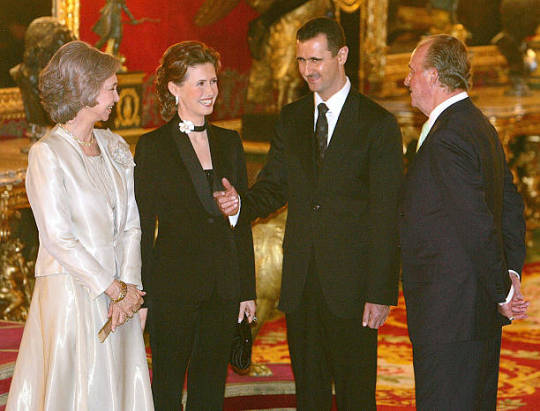
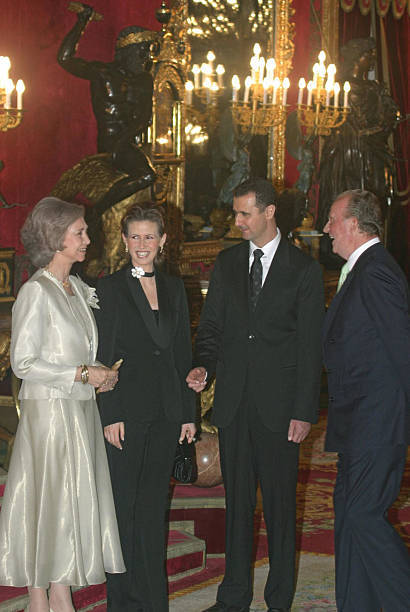
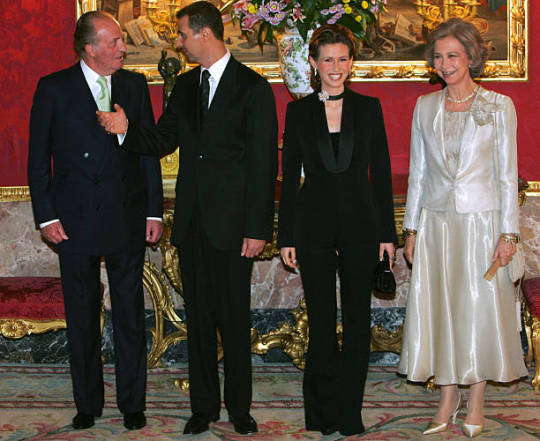
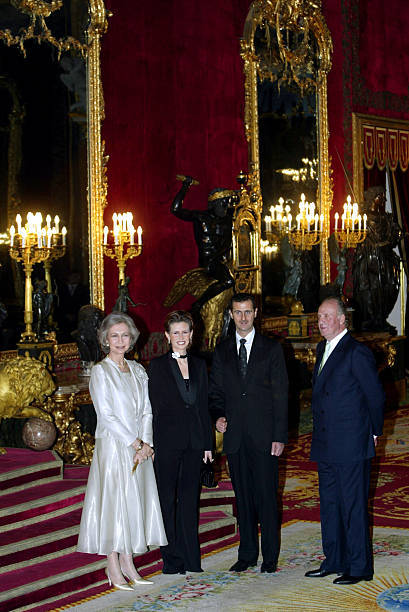

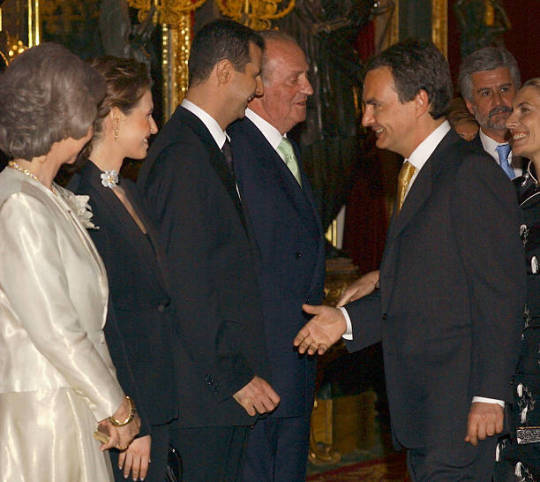
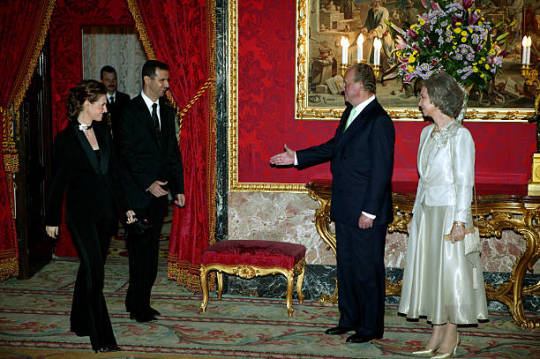

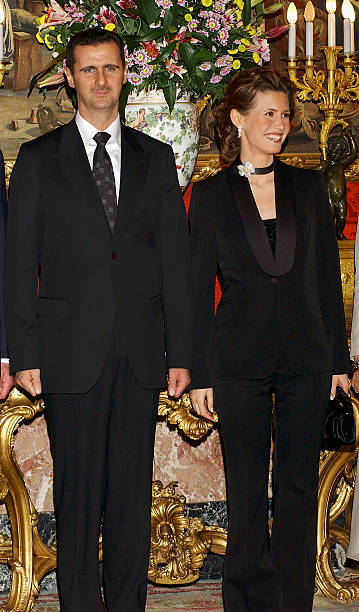
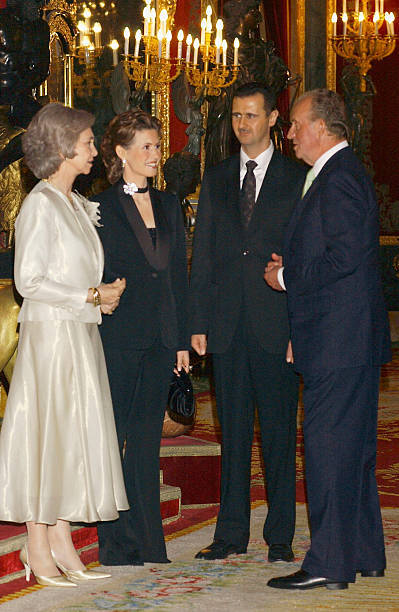
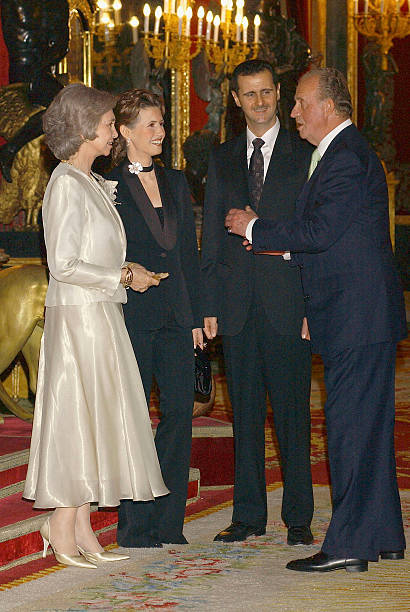
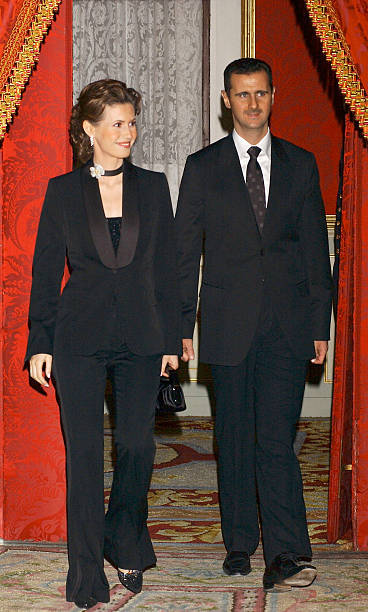
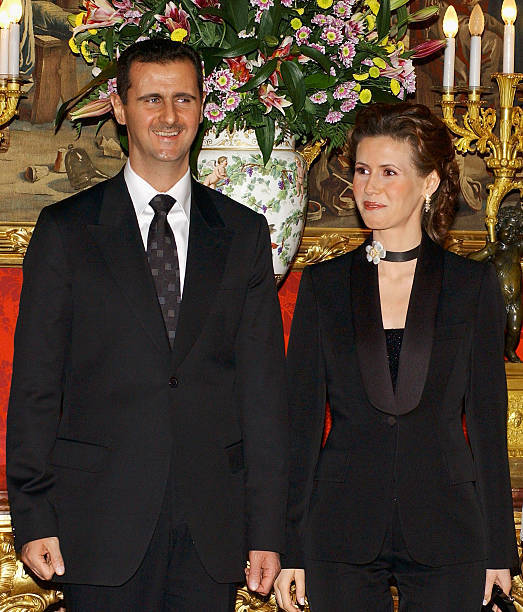
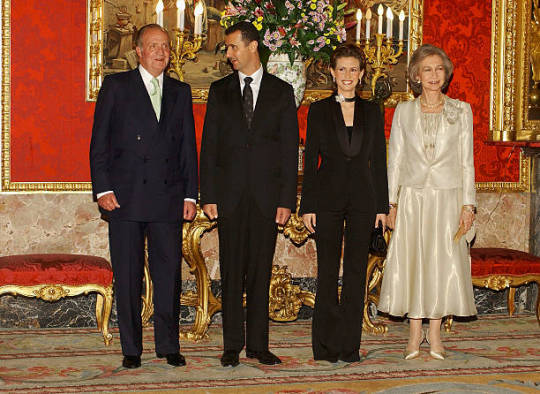
MADRID, SPAIN - JUNE 1: Spain's King Juan Carlos and Queen Sofia receive Syrian President Bashar al-Assad and his wife Asma al-Assad during an official dinner at the Palacio de Oriante on their first day of a visit June 1, 2004 in Madrid, Spain. The Syrian couple is on a two-day official visit to Spain
0 notes
Note
Lalla Salma was not very popular. Rania occupied the first place after Sheikha Mozah, after Suzanne Mubarak, after Asma al-Assad and after Laila bin Ali. Why are attempts to promote it now while it is in hiding? I think Moroccan women took advantage of Rajwa to promote Lalla Salma, but sometimes they would get upset and ask someone where she is, what a funny thing.
Hello , first of all am not trying to promote anyone. Second, the fact that's she's not well known doesn't make her less interesting as a person. Third there's no harm in promoting anything/ anyone as long as we're not being rude. Forth, that woman was suddenly absent in a mysterious way and God knows what happened to her , it's better for us to pray for her safety. Fifth, which is the thing I hate the most ! I suspect this has something to do with nationalities.
1 note
·
View note
Text
Siria, più potere ad Asma e Assad dopo 12 anni si riprende la scena
Quando sono scesi dall’aereo con le insegne siriane a metà marzo sulla pista di Abu Dhabi, il messaggio al mondo è stato subito chiaro: gli Assad sono tornati. Completo scuro lui, tailleur pantalone bianco lei, il presidente siriano e la moglie erano nel primo viaggio ufficiale all’estero insieme dall’inizio della rivolta in Siria, nel 2011.
Da allora il leader aveva lasciato il suo Paese solo…
View On WordPress
#aggiornamenti da Italia e Mondo#Mmondo#Mmondo tutte le notizie#mmondo tutte le notizie sempre aggiornate#mondo tutte le notizie
0 notes
